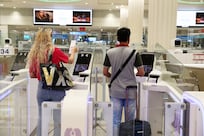
Every Tuesday in the heart of the Greater Cairo district of Giza, sellers of every imaginable good lay out their wares for the area’s locals, many of whom rely on the weekly market for low-priced food, clothes, household goods, electronics and cosmetics.
Starting at the western entrance of the Abdel Aal Canal street in the densely populated El Talbia neighbourhood, one of Cairo’s poorest, the Tuesday market draws thousands of shoppers each week, many of whom would not be able to afford the products on sale anywhere else.
The market, which offers new as well as second-hand items, has become increasingly popular over the past year, as Egyptians contend with record-high inflation.
None of the locals know precisely when the market first opened, although one elderly shopper said she has been visiting it weekly since she moved to the area with her husband in 1989.
The sellers arrive in the morning to their stalls of varying sizes. Each one pays a small fee — either 10 or 20 Egyptian pounds, depending on size of the stall — to a municipal official who comes around once in the morning and once in the afternoon.
The sheer variety of goods makes the market a truly unique shopping experience, though perhaps not one for people used to the calm and order of air-conditioned hypermarkets.
Shoppers navigate through stalls laid out with no discernible pattern — with fish likely to be sold next door to lingerie — put up with the cacophony of salesman bellowing bargains through megaphones, and the blood-curdling cries of animals being slaughtered. Over it all lies the sometimes overwhelming blend of strong smells in the smoggy air.
Variety aside, the market’s draw is prices that are significantly lower than elsewhere, thanks to the unusual ways in which the sellers acquire their wares.
Such sellers are denizens of Egypt’s informal sector that accounts for more than 60 per cent of the economy — and whose backchannels they are intimately familiar with.
“These clothes here, they sell it to guys like me and we resell it at the market,” one vendor told The National.
Used clothes stalls are among the market's busiest.
Standing on a platform, the vendor pulled piece after piece from a freshly opened bag of clothes to show them off to interested onlookers.

All the clothes are priced at one Egyptian pound (3 cents), but some in-demand items are auctioned off in 50-piaster increments to the highest bidder.
A seller of plates and other porcelain, some chipped and some intact, said he bought unwanted stock each week from the nearby Abul Numrus neighbourhood, known for its fine china shops.
He was selling the chipped plates for one or two pounds and intact plates for between 5 and 20 pounds. Similar plates cost four times as much in Abul Numrus, he said. And he offered a discount if a customer bought more than one.

Food stalls at the Tuesday Market are also tremendously popular, with a wide range of meats, cheeses and canned foods on offer at surprising prices.
While some sellers confess that the lower cost is because of lower quality, others do not.
“How are you selling this cheddar for 35 pounds? Is it good or will it make us sick? I know you merchants and your ways,” said a woman holding a 1kg block of the cheese that would cost nearly 400 pounds at hypermarkets.
“I’ll tell you why it’s so cheap. Because I am the one who drives down to the factory two hours away and picks it up,” the seller countered.
“You find it more expensive in stores because you are not only paying for the cheese, you’re also paying for the delivery from the factory which includes the driver’s salary and petrol costs; you’re also paying the store owner a portion for their labour and operational costs. I don’t include those costs — I don’t have a store.”
Another shopper called him a liar. She explained to The National she avoided canned or processed foods at the market after the cheese and canned tuna she bought from this vendor turned out to be inedible.
“A lot of these items are made in unregulated factories,” she said. “I saw a news segment about how they put toxic ingredients in a lot of the cheap cheese they sell. Especially during an economic crisis, you never know what they might be doing to cut costs.”
Using another approach, one vendor was selling smaller portions from packaged foodstuffs that most shoppers here would be unable to afford otherwise.

Standing by an open box of branded breading for fried chicken, which costs 230 pounds at hypermarkets, the vendor used a spatula to fill small plastic bags, each priced at one pound.
He said he sold expensive spices or grains the same way.
While most of the sellers live in Cairo, some travel long distances from provinces outside the capital to sell goods that are not widely available there.
Samia, 49, comes from the agricultural province of Fayoum each week with a large straw basket filled with bottles of rich buffalo milk from the animals on her family’s farm. She makes the one-hour journey to Cairo on the back of a pickup truck early in the morning and goes home at the end of the day.
She also brings ghee and cottage cheese made from buffalo milk, as well as bread baked in traditional mud ovens — a rare delicacy in the capital, where most bakeries use modern methods.
“You can’t really find this stuff in many places in Cairo and many of my clients used to live in the countryside before moving to Cairo, so they have a taste for these products and can’t live without them,” she told The National.
But this week, she was confronted by an angry customer from the previous Tuesday, who accused Samia of diluting her milk with water.
The disgruntled shopper proceeded to pour out samples of milk from every bottle Samia had brought into a cup until she found one with the right consistency. She then insisted on not paying for the bottle because she considered the last sale null.
Samia acquiesced. She told The National that such disputes were common and best settled amicably so that she could return to her spot the next week.
Some shoppers arrive with bags of items that they hope to sell to the merchants.

One merchant buys used bars of soap that he sells to chemical companies that upcycle them into other products. He also takes half-full bottles of perfume and face wash that he sells to other shoppers who cannot afford these items at market prices.
In recent weeks, one woman said that, with prices being so high, she had started going through the rubbish bins in her neighbourhood for things she could bring to sell. She sat on the pavement amid piles of broken toys, scrap metal and empty cosmetics bottles.
She said the empty bottles, often featuring well-known brand names, were bought by manufacturers of knock-off cosmetics.
Next to her, another merchant was selling used school textbooks for a pound each, since new copies have become too expensive for many.

Despite its imperfections, the Tuesday Market has become such an essential part of El Talbia’s community that residents managed to keep it open despite Covid-19 restrictions.
The government repeatedly sent municipal officials to shut the market down because of social distancing rules, but locals protested and stood with the sellers against the municipality, which in the end relented and allowed business to continue.







